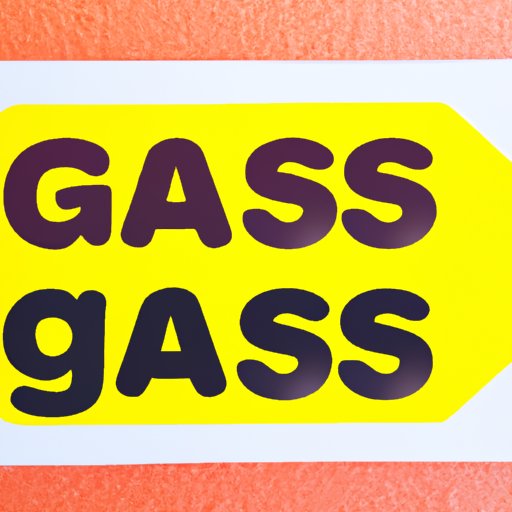
Introduction
Passing gas is a natural bodily function that everyone experiences. While it may be an unpleasant topic to discuss, it’s something that affects us all. Excessive gas can be uncomfortable, embarrassing, and even painful. Fortunately, there are several ways to reduce gas and its associated symptoms. In this article, we’ll explore different tips, remedies, and lifestyle changes you can make to help minimize the discomfort and embarrassment associated with gas. Whether you experience occasional or frequent gas, there’s something here for everyone.
Let It Go: 5 Tips for Passively Passing Gas
Passive gas release is the most natural and least disruptive way to pass gas. Here are five tips for reducing the frequency of gas and minimizing its impact on your daily life:
– Stay hydrated and drink plenty of water throughout the day.
– Incorporate regular exercise into your routine to aid digestion and reduce bloating.
– Eat slowly and chew your food thoroughly to aid proper digestion.
– Avoid carbonated drinks and chewing gum as they can increase the amount of air you swallow and contribute to gas.
– Limit your intake of fatty, greasy, and spicy foods which can stimulate gas production.
Silent But Deadly: Practicing Proper Flatulence Etiquette
While passing gas in public may be embarrassing for some, it’s a natural occurrence that everyone experiences. Holding in gas can actually be harmful as it can cause abdominal pain and discomfort. However, there are ways to practice proper etiquette when passing gas in social situations. Here are a few tips:
– Excuse yourself to go to the bathroom or a private location if possible.
– Avoid passing gas in confined spaces like elevators or small rooms.
– If you can’t hold in your gas, try to pass it silently and discreetly.
– If you’re in a situation where you can’t escape, don’t draw attention to it and simply apologize if necessary.
Breaking Wind: How to Control Gas-Producing Foods
Certain foods can trigger gas production, which can lead to discomfort and embarrassment. Here are some common foods to be aware of:
– Beans and legumes
– Dairy products
– Cruciferous vegetables such as broccoli, Brussels sprouts, and cauliflower
– Onions and garlic
– High-carb foods like bread and pasta
Once you’ve identified the culprits, try implementing the following tips to reduce gas:
– Gradually increase your intake of gas-producing foods to give your body time to adjust.
– Incorporate digestive aids like ginger, fennel, and peppermint into your diet.
– Consider taking a digestive enzyme or probiotic supplement to aid digestion and improve gut health.
Toot Talk: Natural Remedies for Gas Relief
There are several natural remedies that can help relieve gas discomfort. Here are a few options to consider:
– Chamomile tea has natural anti-inflammatory properties that can help reduce gas pain and bloating.
– Ginger tea can stimulate digestion and reduce bloating.
– Peppermint oil can help relieve gas and bloating by relaxing the muscles in the digestive tract.
– Activated charcoal can help reduce the odor associated with gas and may also help absorb excess gas.
The Gas-Free Guide: Reducing Symptoms of Bloating and Gas
Bloating and gas discomfort can be uncomfortable and frustrating. Here are some tips for managing these symptoms:
– Stay hydrated and drink plenty of water to help move things along in the digestive tract.
– Incorporate physical activity into your daily routine to aid digestion and reduce bloating.
– Avoid eating too quickly or overeating, as this can contribute to bloating and gas.
– Try using a heating pad or taking a warm bath to help relax the muscles in your digestive tract.
– Consider over-the-counter medications like simethicone to help break up gas bubbles and reduce bloating.
Farting with Confidence: Building a Healthy Gut Microbiome
The bacteria in your gut play a significant role in gas production. Here are some tips for building a healthy gut microbiome:
– Incorporate probiotic-rich foods like yogurt, kefir, and sauerkraut into your diet.
– Avoid antibiotics unless absolutely necessary, as they can disrupt the natural balance of bacteria in your gut.
– Consider taking a probiotic supplement to help replenish good bacteria in your digestive tract.
– Reduce stress levels through mindfulness practices such as meditation, yoga, and deep breathing exercises.
Conclusion
Passing gas is a natural bodily function that can be uncomfortable and embarrassing at times. However, with the tips and remedies provided in this article, you can find relief and reduce the discomfort associated with gas. By making simple lifestyle changes, paying attention to your diet, and practicing proper etiquette when in social situations, you can manage your symptoms and live with greater comfort and confidence.




